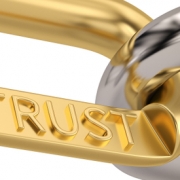It’s Honesty And Trust That Cause The Market Economy To Thrive.
Critics of free market economies often attempt to tar such systems as being run by “greed.” Indeed, even many advocates of market economies emphasize that free markets are effective at harnessing the motivating factor of self-interest to generate widespread benefits.
Often overlooked in the discussion, however, is just how vital honesty and trust are for a well-functioning market. As Walter Williams wrote in this 2005 article, “Honesty and trust are not simply matters of character and morality; they’re crucial for efficient human interaction and a smoothly working economy.”
Yes, two indispensable cogs in the capitalist machine so often caricatured by the greedy monopoly man and Gordon Gekko of Wall Street fame are the virtuous traits of honesty and trust.
Just imagine how inefficient market transactions would become if actors in the market didn’t have a significant level of trust. Countless transactions and economic activities take place every day that reflect a level of trust that has become so taken for granted most don’t even recognize it.
As Williams wrote, “Imagine the costs and inconvenience we’d suffer if people were generally dishonest and we couldn’t trust anyone. We would have to lug around measuring instruments to ensure, for example, that it was ten gallons of gas and one pound of steak we purchased.”
The transaction costs for minor exchanges would become unbearable.
But with a heavy dose of trust, millions of transactions take place every day from as simple as “mow my lawn and I’ll pay you twenty bucks,” to providing your credit card number to a website on the other side of the country in exchange for a promise that books or clothes will be delivered in just a few days.
But that’s not all. FedEx and UPS drivers leave thousands of packages on front porches across the country every day, with an amazingly low rate of theft. And have you ever noticed stores that leave inventory unguarded outside at night; for instance, Home Depot leaving hundreds of bags of mulch for sale out in its parking lot every spring?
In areas where there are lower levels of trust, these actions “would be equivalent to economic suicide,” according to Williams. But because of a generalized level of trust, merchants leave valuable inventory left unguarded with the confidence that little, if any, of it will be stolen. Because the store is able to maximize revenue by taking full advantage of all the available space it has leased, honesty and trust enables higher profit levels and in turn greater economic and job growth for communities.
However, Williams notes, “(t)he fact that honesty and trust are vital should make us re-think the treatment of the dishonest and untrustworthy. Dishonest people impose losses that go beyond those suffered by their direct victims.”
If “porch pirates” run amok, for example, “the rest of us incur costs when delivery companies stop leaving packages unless someone is home,” Williams points out.
Moreover, if merchants see high rates of theft of their products left out overnight, they’ll be forced to severely limit the inventory they have to offer, denying consumers choices and driving up prices.
In sum, Williams concludes, “It’s safe to say that whatever undermines trust and confidence raises the costs of transactions and makes us worse off.”
While there’s no denying theft and fraud exist, such instances are relegated to the exception rather than the rule – especially relative to the millions of transactions that take place every day.
Without such high levels of honesty and trust, our economy would not have reached the current heights that were unfathomable a generation ago.
Cynics may say it is greed the fuels a market economy, while others may point out that a market economy harnesses people’s self-interest for the common good.
But also included in the discussion should be the vital role played by virtues like honesty and trust that pave the way for a market economy to thrive.





